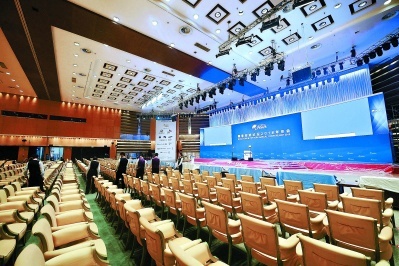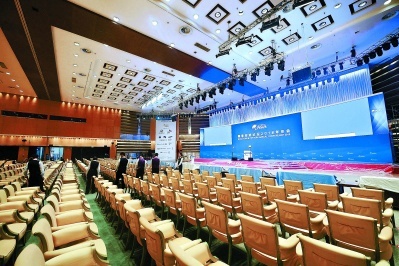By Yan Yu from People’s Daily Overseas Edition

Opinions from around the world are being shared under the theme of "An Open and Innovative Asia for a World of Greater Prosperity", as the 2018 Boao Forum for Asia (BFA) opened on Sunday in Boao, south China’s Hainan province.
At this moment when the world economy clouds over with anti-globalization, trade and investment protectionism, and regional setbacks of globalization, Asia and the world as a whole need more openness and coordination, instead of isolation, more than any time before, said BFA secretary-general Zhou Wenzhong, explaining the reason for adopting the forum’s theme and topics.
The world needs inclusiveness and balance, rather than wealth inequality, Zhou added.
Given a global economy subject to sluggish growth, increasingly complicated uncertainties and a yet-to-come new round of technology revolution, Asia and the world should adopt new ideas and promote growth via innovation instead of merely enlarging factors of production, he added.
"Openness and innovation are two key words of the forum. China’s economic achievement is undoubtedly the largest miracle among the remarkable accomplishments made by Asia after the 20th century,” Yang Xiyu, vice president of BFA Research Institute, told People’s Daily.
These accomplishments are distinct, but openness and innovation are their common features, Yang said.
The importance of major Asian economies will be gradually revealed since 2018, said a report by the London-based Center for Economic and Business Research released at the end of 2017.
The report predicted that China, India and Japan will become three of world’s four largest economies by 2032.
The International Monetary Fund also forecasted a 5.4-percent economic growth of the Asia-Pacific region in 2018, which is higher than the growth of the globe and the other regions.
Due to political and economic impacts from Europe and the US, the tide of anti-globalization continues to emerge. The most recent instance is the US government’s frequent protectionist behaviors that drew dissatisfaction around the world.
But facts have indicated that globalization is not easy to be reversed.
On the contrary, globalization will move forward steadily and continuously, as it has been persuasively proved by the solid progress of a series of projects and cooperation, including the Regional Comprehensive Economic Partnership, the free-trade zone in the Asia-Pacific region and the ASEAN-China Free Trade Area.
“The forum takes place in the 40th anniversary of the reform and opening-up and after the launch of new plans and requirements at the 19th National Congress of the Communist Party of China. Against this backdrop, the speeches delivered by Chinese leaders will inevitably become a focus of the international community,” Yang said.
Yang believes the forum will open a window for the world to explore China’s specific measures to deepen reform and further open up and their global influence.
“Over the past 40 years, especially since the 21st century, China has not only benefited from, but also made contributions to economic globalization. Therefore, it’s untrue for some countries to say that China just profits on the results of globalization,” said Xu Hongcai, an economist with the China Center for International Economic Exchanges.
China has marched toward marketization through reform and innovation, used its comparative advantages to find its position in the global value chain, and conducted equal-footed and mutually beneficial cooperation to achieve win-win results, Xu pointed out.
Conforming to the general law of market economy and international rules is what China has always been adhered to and the country’s precious experience for the world, Xu said.
At this moment when the world economy clouds over with anti-globalization, trade and investment protectionism, and regional setbacks of globalization, Asia and the world as a whole need more openness and coordination, instead of isolation, more than any time before, said BFA secretary-general Zhou Wenzhong, explaining the reason for adopting the forum’s theme and topics.
The world needs inclusiveness and balance, rather than wealth inequality, Zhou added.
Given a global economy subject to sluggish growth, increasingly complicated uncertainties and a yet-to-come new round of technology revolution, Asia and the world should adopt new ideas and promote growth via innovation instead of merely enlarging factors of production, he added.
"Openness and innovation are two key words of the forum. China’s economic achievement is undoubtedly the largest miracle among the remarkable accomplishments made by Asia after the 20th century,” Yang Xiyu, vice president of BFA Research Institute, told People’s Daily.
These accomplishments are distinct, but openness and innovation are their common features, Yang said.
The importance of major Asian economies will be gradually revealed since 2018, said a report by the London-based Center for Economic and Business Research released at the end of 2017.
The report predicted that China, India and Japan will become three of world’s four largest economies by 2032.
The International Monetary Fund also forecasted a 5.4-percent economic growth of the Asia-Pacific region in 2018, which is higher than the growth of the globe and the other regions.
Due to political and economic impacts from Europe and the US, the tide of anti-globalization continues to emerge. The most recent instance is the US government’s frequent protectionist behaviors that drew dissatisfaction around the world.
But facts have indicated that globalization is not easy to be reversed.
On the contrary, globalization will move forward steadily and continuously, as it has been persuasively proved by the solid progress of a series of projects and cooperation, including the Regional Comprehensive Economic Partnership, the free-trade zone in the Asia-Pacific region and the ASEAN-China Free Trade Area.
“The forum takes place in the 40th anniversary of the reform and opening-up and after the launch of new plans and requirements at the 19th National Congress of the Communist Party of China. Against this backdrop, the speeches delivered by Chinese leaders will inevitably become a focus of the international community,” Yang said.
Yang believes the forum will open a window for the world to explore China’s specific measures to deepen reform and further open up and their global influence.
“Over the past 40 years, especially since the 21st century, China has not only benefited from, but also made contributions to economic globalization. Therefore, it’s untrue for some countries to say that China just profits on the results of globalization,” said Xu Hongcai, an economist with the China Center for International Economic Exchanges.
China has marched toward marketization through reform and innovation, used its comparative advantages to find its position in the global value chain, and conducted equal-footed and mutually beneficial cooperation to achieve win-win results, Xu pointed out.
Conforming to the general law of market economy and international rules is what China has always been adhered to and the country’s precious experience for the world, Xu said.
 Menu
Menu
 China embraces world with open gesture
China embraces world with open gesture
















